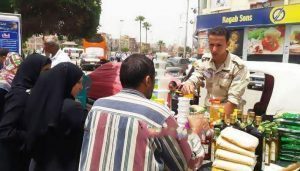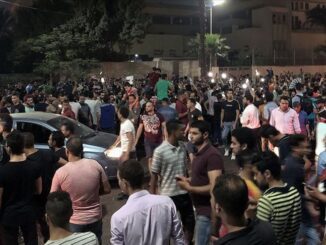
Hours after an escalating crisis of the severe shortage of subsidized infant milk in Egypt, Egyptian Minister of Health Ahmed Emad said that the Egyptian Armed Forces pumped 30 million packages of infantry milk in the pharmacies for 30 pounds each instead of 60 pounds, according to Huffington Post Arabic.

In this context, Dr. Mohamed Mahsoub, the former minister of state for parliamentary affairs during President Mohamed Morsi’s era, commented on the Egyptian Armed Forces interference in the infant milk crisis by providing 30 million infant milk packages as well as supervising the food services and the hostel kitchens of Cairo University recently, saying on his Tweeter account,”From where did the infant milk reach the Egyptian Armed Forces to pump it to the Ministry of Health?” Since the military coup in 2013, the Egyptian Armed Forces moved in steady steps to sweep Egypt’s civilian activities.The Egyptian Army has recently penetrated nearly every economic activity in the country.
In response to the milk protest, the parliamentary health committee said that it brainstormed solutions and announced that it has actually discussed the matter last Tuesday. “They concluded that they should leave it up for the Armed Forces to either provide dollars to be able to import the necessary products or to import through the Armed Forces,” said Parlmany News . MP Makram Radian, who is a member of the Health Committee has added that the Armed Forces are also planning to start their own factory to provide milk and medicine for children.
Days ago, Dr. Mohamed Osman Al-Khosht, the Cairo University Vice President for Education and Student’s Affairs, unveiled that Cairo University signed a contract with Egypt’s Armed Forces to supervise the food services and the hostels’ kitchens.
A week ago, the Egyptian Ministry of Supply gave away its responsibility in managing the subsidy card system to the Ministry of Military Production, and the Awkaf (Religious Endowment) Ministry’s authorization of the Ministry of Military Production to sell 10,000 acres of land related to Al-Awkaf to investors, which ensures the accusations raised against the military institution that it seeks to fully control all the economic and civil activities in Egypt.
The recent roles dominated by the Ministry of Military Production are added to other projects that have been dominated by the military such as automating the agriculture property documentation and a contract for constructing a new building for the Lawyers Syndicate which is consistent with the military institution’s penetration of the Egyptian politics and economy in general.
The military also dominated the political positions, starting from the presidency that was usurped by Abdel Fattah al-Sisi, who led a military coup that brought him to power, as well as a large number of ministers with a military background (a number of army generals appointed as ministers, not necessarily military-related ministries).
Among these areas penetrated by the military were: the administration of governorates (provinces), districts, universities, research centers, the national institutes, the consumer’s protection associations, sports stadiums, public hospitals and foreign schools (schools teaching foreign curricula such as the American, British and Canadian diplomas), the boards of directors in holding companies and the oil and natural gas sectors and others.
In March 2014, the Washington Post said that the Egyptian Armed Forces control nearly 60% of the Egyptian economy pointing that the revenues of these projects aren’t announced to the Egyptian public.
The Subsidized Infant Milk Crisis
Dozens of Egyptian mothers protested on the Nile Corniche, a major Cairo road, blocking traffic to denounce the lack of subsidized infant milk, as well as the increased prices.
During the protest, some of the mothers broke into tears while displaying empty milk bottles to reporters as they stood for hours on the asphalt with no protection from the burning sun. A mother was seen shouting at the policemen: “We are not talking about tomatoes, food, or drink, but formula for the babies.”
Mahmoud Fouad of the Egyptian Center to Protect the Right for Medicine said this is the first time that Egypt has cut infant milk subsidies.
He said, “It’s also the first time that mothers rally in the streets to ask for food for their babies.”
In fact, the infant milk prices have increased 40% and the Ministry of Health has announced that, “starting this month, authorities will issue cards to mothers who meet certain criteria making them eligible for the subsidized infant milk— such as having twins, working for more than seven hours a day, or having medical records that show poor health,” reported the Washington Post.
It’s not clear what exactly caused the infant milk shortages as the ministry is introducing about 1,000 government-run distribution centers for infant milk across the country.
In this context, Health Minister Ahmed Radi said in a Cabinet statement that the government measures will regulate distribution so the subsidized infant milk can go to those who need it the most.
The ministry said that the government provided 18 million packages of infant milk , worth 450 million Egyptian pounds (about $51 million).
Austerity Measures Would Stoke Unrest
In fact, the protests highlight how strict austerity measures are hitting ordinary Egyptians hard.
Last month, the International Monetary Fund initially agreed to give Egypt a $12 billion loan over three years. Cuts in subsidies and new taxes as (VAT) are part of the economic reforms are part of the government’s reform program in securing the loan, which is still subject to approval by IMF’s executive board.
However, the deal that is said to heal the country’s wrecking economy would lead to unrest in Egypt as subsidy cuts have a history of stoking unrest at previous times.
Egypt is seeking to obtain the IMF loan to help stabilizing the country which is facing one of its harshest economic crises in its history.



